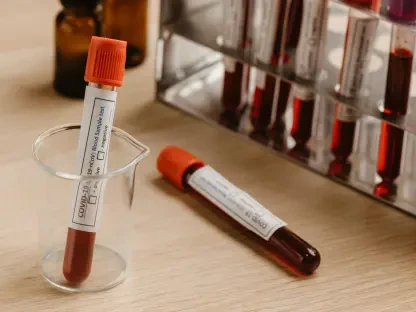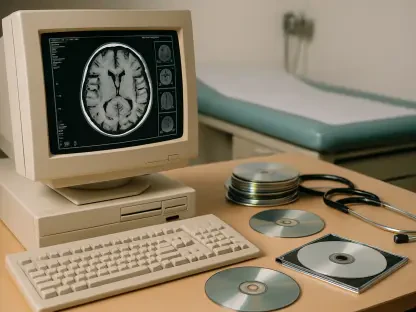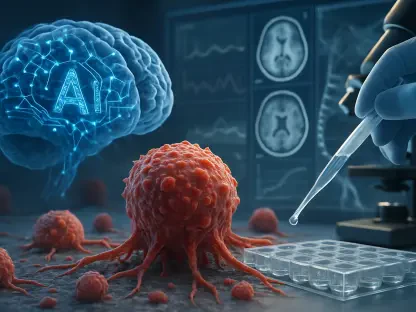Imagine a clinical trial where every participant must navigate a maze of assessments, travel long distances, and adjust their daily routines, only to discover that much of the information collected isn’t even essential to the study’s core goals. A recent working paper from the Tufts Center for the Study of Drug Development, in collaboration with 14 biopharmaceutical companies, uncovers a startling reality: about one-third of the data gathered in over 100 phase 2 and 3 trials is unnecessary for primary analyses. This revelation, while still awaiting peer review, points to a growing challenge in clinical research where the sheer volume of data collection is overwhelming both patients and trial sites. The escalating complexity of trial protocols over recent decades has intensified these burdens, raising critical questions about efficiency and participant well-being. This issue not only affects timelines and costs but also the very individuals who volunteer to advance medical progress.
The Growing Complexity of Clinical Trials
Escalating Data Volumes and Trial Intricacies
Over the past few decades, clinical trials have evolved into increasingly elaborate endeavors, with protocols incorporating customized designs, stringent eligibility criteria, and a higher number of endpoints and participants spread across numerous locations. This shift has significantly complicated the research process, leading to poorer trial performance as more time and resources are devoted to patient recruitment, retention, and data management. A striking insight from earlier research by the Tufts Center highlights the scale of this issue, showing a dramatic rise in data points collected during phase 3 trials. This surge in information, while intended to provide comprehensive insights, often results in inefficiencies that strain both human and operational resources. The added complexity translates into longer timelines for data cleaning and analysis, ultimately delaying the delivery of potentially life-saving treatments to the market and impacting the overall feasibility of conducting such studies.
Impact on Patients and Trial Sites
The consequences of this growing complexity extend beyond operational challenges, placing a substantial burden on trial participants and the sites that host these studies. Patients often face demanding schedules that require frequent travel, lifestyle adjustments, and multiple assessments within a single day, sometimes at different facilities. These requirements can lead to significant stress and fatigue, potentially discouraging participation or causing dropouts, which further complicates trial outcomes. Meanwhile, trial sites grapple with the logistical demands of managing vast amounts of data and coordinating intricate protocols, often with limited resources. This dual burden underscores a critical need to reassess how trials are structured to ensure they remain feasible for all involved parties. Without addressing these challenges, the clinical research community risks undermining the very goals of advancing medical innovation through participant-driven studies.
Addressing the Data Overload Challenge
Identifying Unnecessary Data in Trials
A key finding from the collaborative study is the identification of data that does not contribute to primary or secondary endpoints, categorized as either “non-core” or “non-essential.” Non-core data, while not required by regulators, is often collected for exploratory purposes, whereas non-essential data represents excess information beyond what is needed for critical analyses. Through algorithms that measure patient burden—factoring in aspects like travel time and required lifestyle changes—researchers determined that 25% to 30% of the burden on participants stems from gathering this unnecessary data. This insight reveals a pressing need for trial sponsors to strike a balance between collecting information for future innovation and minimizing immediate stress on patients and sites. By focusing only on data integral to study objectives, the research process can become more streamlined, reducing inefficiencies that currently hinder progress.
Strategies for Optimizing Data Collection
In response to these findings, there is a growing push within the industry to optimize data collection practices, as emphasized by the executive director of the Tufts Center, who led the study. Clinical teams are encouraged to adopt intentional, fit-for-purpose trial designs that prioritize reducing burdens while still meeting regulatory and scientific needs. This approach aligns with forthcoming guidelines from the International Council for Harmonization of Technical Requirements for Pharmaceuticals for Human Use, which advocate for more efficient trial frameworks. Additionally, member companies of the collaborative group are developing a shared framework to streamline data practices, with plans to disseminate these strategies across the broader industry. Such collaborative efforts signal a consensus that addressing data overload is essential to improving trial outcomes and enhancing participant experiences, paving the way for more effective research methodologies.
Future Pathways for Efficient Research
Looking back, the detailed analysis provided by this study served as a pivotal moment in recognizing the pervasive issue of unnecessary data collection in clinical trials. It highlighted how a significant portion of gathered information failed to contribute to key analyses, disproportionately impacting patients and trial sites. Moving forward, the clinical research community was urged to prioritize actionable steps, such as adopting data-focused frameworks and aligning with emerging regulatory guidance to reduce inefficiencies. These efforts aimed to ensure that future trials balanced the pursuit of innovation with practical considerations for participant well-being. By rethinking data collection strategies, the industry hoped to enhance the overall effectiveness of clinical research, ultimately delivering faster and more impactful medical advancements to those in need.









